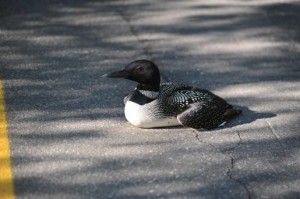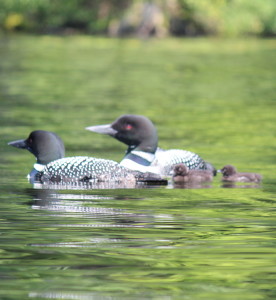Silence on Maine’s Lakes: Help Prevent Lead Poisoning of Our Loons
Lakefront Property Owners Use Rain Barrels To Help Prevent Poor Water Quality
August 7, 2014Out and About for the Bangor Lakes Region of Maine Aug. 14-20
August 14, 2014Silence on Maine’s Lakes: Help Prevent Lead Poisoning of Our Loons
Loon Family — Three-Day-Old Chicks
by Leigh Macmillen Hayes
As lakefront homeowners in Maine, we associate the call of the loon with summer. And this summer, on our lake a pair of loons finally had success in breeding chicks. The babies are now about three weeks old and many of us feel like grandparents as we keep a watchful eye on the family. Just this week, the parents were placing small fish before the chicks, who would greedily grab and swallow them.
As a lakefront property owner, you are probably enjoying time out on the water, angling for your favorite fish. Laura Suomi-Lecker, technical director for the Somerset County Soil and Water Conservation District, asked us to remind anglers who still use lead fishing tackle that they are putting waterbirds at serious risk, particularly our loons.
“Of the many threats to loon populations, lead poisoning is the number one cause of death of adult loons,” says Laura.
Lead-poisoned Loon Found on Bunker Hill Road, Jefferson, Maine
“The scenario plays out on many of our local lakes and ponds every year. Last June, an adult loon was found in the middle of Bunker Hill Road in Jefferson, near Deer Meadow Pond. The bird was disoriented and helpless as traffic moved past. Finally, concerned citizen, Paula Roberts, arrived on the scene and stopped to help. She transported the bird to Avian Haven Wild Bird Rehabilitation Center in Freedom, where an x-ray confirmed that he had ingested a lead-headed fishing jig.
Avian Haven’s compassionate care and efforts to save the Jefferson loon and many others over the years is nothing short of heroic. Radiographs and blood testing are standard primary diagnostic tools, followed by swift appropriate action to stop the lead poisoning process. The gastric lavage technique that Avian Haven uses is an incredible advance in treating lead poisoned loons. This technique allows for the safe and quick removal of lead and other foreign objects from the gastro-intestinal tract of even very down and out birds.
Unfortunately, despite these efforts, the Jefferson loon died within a couple of days of rescue. In July of this year, the story was repeated with a leaded loon from Crystal Lake in Gray. The reality is that only prevention can save loons from lead. Lead poisoning effects on the body are severe and fast, causing damage to organs and body systems. Loons with lead poisoning are generally disoriented, unable to fly and dive, struggling simply to remain upright. Sadly, to date there have been no reported cases of a loon surviving lead ingestion.”
With this information in mind, we ask you to open your tackle box and get the lead out!
To view lakefront properties for sale on Crystal Lake in Gray, click on the green box above.
To learn more about Crystal Lake and the Gray area in the Sebago Lakes Region of Maine, check out the blog links below.
Crystal Lake and Little Sebago Lake in Gray, Maine, Relished by Lakefront Property Owners
Summer Vacation Should Include Visit to Maine Wildlife Park in Gray, Maine
Hikes In and Around Gray, Maine

